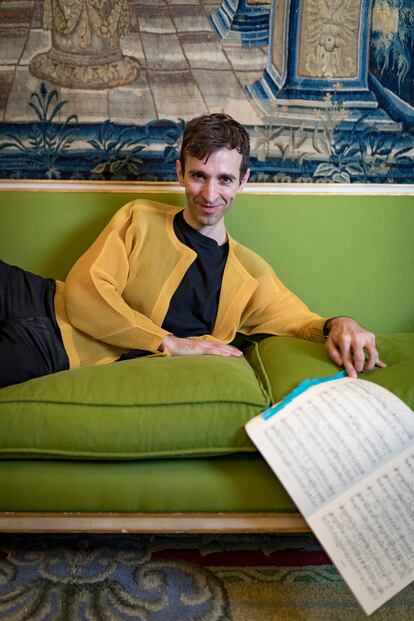Anthony Roth Costanzo, countertenor: ‘Opera bores you at first, but in return, it offers you deeper pleasures. It’s like tantric sex’
With a tone that goes beyond genres, Anthony Roth Costanzo arrived relatively late to opera and reached the top. A countertenor and producer, he wants to connect this musical art with the general public. He claims that not only is it relevant — it’s orgasmic

North Carolina, the capital of tobacco and moonshine, is a place so American that the gold rush and Pepsi were born there.
Anthony Roth Costanzo, 41, is also from there. However, despite being born in Durham, he has managed to position himself as one of the most notable figures in a field that is extremely European, insular, traditional and aristocratic. The world of opera is quite remote from whatever Pepsi represents.
“I came to classical music as an outsider, at an almost adult age for opera standards,” he recalls, while walking through the backstage of Madrid’s Royal Theater, a place he knows well. This past October, he was part of the cast of Orlando, by Händel. And earlier, in July, he starred in his own recital. “I started singing at age 11. And by age 12, I had sung with Pavarotti!”
In classical music — as in tennis — origins matter. To be born far from the elite is to expose yourself to a lifelong sensation of being a tourist in your own skin. But being a tourist has its advantages. Things that have always been one way can suddenly be seen from another perspective. And on the road from Durham to New York’s Metropolitan Opera, Roth got to see opera from the outside and from other disciplines.

“At age 11, I told my parents — who both taught at Duke University — that ‘I can’t be in North Carolina anymore. I’ve exhausted all the possibilities here. I want to go to New York.’ So, I went and I auditioned. And I got this Broadway National Tour first and then all these plays.” As a child actor, he went from plays to opera. He was in The Turn of the Screw — an opera composed by Benjamin Britten, based on the 1898 novella by Henry James — and, in 1994, he sang a duet with Pavarotti at a gala in Philadelphia.
From the stage, Roth then made the leap to the big screen. His voice caught the attention of director James Ivory, who included the countertenor in his film A Soldier’s Daughter Never Cries (1998), casting him as the son of Jane Birkin and Kris Kristofferson.
“Of all of James’ masterpieces, I did the one that nobody saw,” Roth laments. Still, he developed a close friendship with the director, which continues to this day. Roth then met Karole Armitage, a legendary choreographer who had worked with the likes of Madonna and Michael Jackson. She convinced Roth — who, by that point, was a student at Princeton University — to be the producer of a short-length documentary, The Double Life of Zefirino. He began to thrive at the intersection of high-brow cinema, opera and pop music.

Once, in London, Roth put on a duet show with trans performer Justin Vivan Bond. “I wanted to sell tickets and, in the meantime, I went on Grindr [a social networking app for the LGBTQ+ community]. Suddenly, I understood that I had a potentially huge audience in front of me. The thing is that people on Grindr are usually thinking about only one thing. So, I invited them to go to our show… and, if they sent me a photo of their ticket, I would show them a photo of my penis. It worked out pretty well!” When the show moved to New York, Grindr was an official sponsor.
Today, Roth holds a lot of weight in the world of classical music, while he also borders on the eccentric. As a countertenor, he has sung at the Met in New York, the English National Opera in London, the Royal Theater in Madrid, and with the philharmonic orchestras of Berlin, London, New York and Los Angeles. He has also appeared twice on NPR’s Tiny Desk and won first prize at Operalia, Plácido Domingo’s contest. His latest album is nominated for a Grammy (his second nomination). Still, he finds it strange when he considers his place in the world of opera, or the place that opera has in the world.

He often wonders what lies beyond institutional recognition. “In this story, there are three of us: the public, the artists and the institutions. And the connection between us is broken. Institutions don’t attract the public. That’s what I want to change.” Carnegie Mellon University has just given him a $650,000 grant to tinker with formulas to do just that. “On stage, I’m always thinking about people who have never been to the opera. What 30 seconds of the experience are going to make them feel like they’re getting something exciting? The majesty of the auditoriums is attractive, but that’s only for a very closed audience, isolated from reality. Who’s going to keep this 400-year-old art alive?”

Roth is a countertenor, which means that his register is closer to the feminine voice than the masculine one, in the castrati tradition. “As a child on Broadway, I performed with a soprano voice. I learned to imitate the nun who sang Climb Every Mountain in The Sound of Music.” Roth was part of the popular 1998 Broadway revival of this work. “I would sing that all the time. And my mother thought it was hilarious. So, whenever it was her birthday, she would request Climb Every Mountain. I loved that kind of high singing. And, you know, I think most men decide not to do that, when they turn 13, or are told that they should be a man and not sing high, because we associate high pitch with feminine and low pitch with masculine.”

He continues: “But my parents — who were psychology professors — never imposed that idea on me. It never seemed feminine or pejorative to me to sing in a high voice, it was simply something I knew how to do. Now that we’re deconstructing the genre, we have an art form — opera — that specifically asks you: ‘Can a man sound like that?’ And it’s not an abstract question. People often ask me: ‘What’s your real voice? What’s your male voice?’ When I sing Orlando at the Royal Theater in Madrid, I would guess that only 30% of the people in the audience have heard a countertenor before.”
This surprise offers a lot of potential. “Many people — and many ears — take opera as something very serious,” he explains. “But let me tell you one thing: opera isn’t serious. It’s intimate. We all have a voice: opera singers just use it at the Olympic level, it’s an extreme sport in that sense. But in terms of the intimacy, I think that, in our society today, everything is through screens or microphones, which goes through a wire, which goes through a speaker. Which means that there’s a filter [between the voice and the audience]. But in opera, we don’t use microphones: something comes out of my body and goes directly into your body. Musically speaking, it’s unprotected sex. It’s penetration.”
Many interviewees would likely wind down after uttering such a metaphor. But not Roth.

“People don’t understand how exciting opera is,” he continues. “During the first 10 minutes, you’ll be bored no matter who’s on stage. But you have to allow yourself to be bored. Because we spend the entire day scrolling through a feed that has 35 images per second, and you need to let the pace of your mind slow down a little, which takes about 10, 15 minutes. If you survive those 10, 15 minutes, you can connect with that penetration that I told you about before. It’s like tantric sex. Instead of immediate gratification, you find one that’s much deeper, more exciting… sometimes hilarious.”
Sign up for our weekly newsletter to get more English-language news coverage from EL PAÍS USA Edition
Tu suscripción se está usando en otro dispositivo
¿Quieres añadir otro usuario a tu suscripción?
Si continúas leyendo en este dispositivo, no se podrá leer en el otro.
FlechaTu suscripción se está usando en otro dispositivo y solo puedes acceder a EL PAÍS desde un dispositivo a la vez.
Si quieres compartir tu cuenta, cambia tu suscripción a la modalidad Premium, así podrás añadir otro usuario. Cada uno accederá con su propia cuenta de email, lo que os permitirá personalizar vuestra experiencia en EL PAÍS.
¿Tienes una suscripción de empresa? Accede aquí para contratar más cuentas.
En el caso de no saber quién está usando tu cuenta, te recomendamos cambiar tu contraseña aquí.
Si decides continuar compartiendo tu cuenta, este mensaje se mostrará en tu dispositivo y en el de la otra persona que está usando tu cuenta de forma indefinida, afectando a tu experiencia de lectura. Puedes consultar aquí los términos y condiciones de la suscripción digital.









































